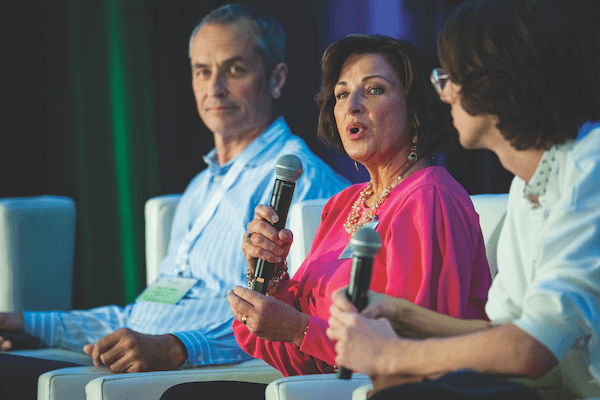How manufacturers are approaching sustainability.

When it comes to the future of sustainability in the sleep products industry, there are many ways for companies to create change, from manufacturing processes to innovation to recycling. The conference concluded with a panel titled, “Parts of a Whole: How Manufacturers of Mattress Components Are Innovating for a More Sustainable Future.” ISPA President Ryan Trainer moderated the discussion. He asked panelists how their respective companies are approaching sustainability and their thoughts on the future.
The panel included:
Jenny Tinsley
Manager of corporate communications and environmental, social and governance for Culp Inc., a ticking and textile producer headquartered in High Point, North Carolina, with facilities in the United States, China and Canada.
Ethan McGuigan
Sustainability systems manager for Leeds, England-based Harrison Spinks, a manufacturer of mattresses and mattress components.
Dennis Mater
Director of performance fibers for Kaneka North America LLC, one of three U.S. divisions of the Kaneka Corp., a producer of synthetic fibers and other products, headquartered in Osaka, Japan.
Manufacturers have an opportunity to affect change due to their position, arguably near the top of the industry, where products then trickle down to distributors, retailers and ultimately, the consumer. Recognizing manufacturers’ shared influence, Mater referenced a presentation from earlier in the conference by Josh Riggs, senior manager of global sustainability for Milliken.
“When we look at companies like Milliken that have been around for decades and have been successful, part of the reason is because they take a leadership position in just about everything they do. To survive long term, we’re going to have to be very assertive and aggressive,” Mater said.
Kaneka embodies this philosophy, with sustainability at the core of its culture and business model, he said. Mater shared that approximately six years ago, the company’s executive leadership decided that all future growth initiatives and capital investment must fit under two goals. “The first is to improve the environment in which we all live, the planet. The second is to improve the human condition or human experience,” Mater said.
For companies with fewer employees or resources, Kaneka’s North Star might seem too lofty or unachievable. But Trainer shared part of a conversation he had with McGuigan, who offered a useful insight. He commented that companies that have yet to consciously embark on a sustainability journey often are already doing something sustainable. And once they identify it, they should focus on it and use it as a recheck going forward.
McGuigan also remarked on Harrison Spinks’ recent initiative to pivot from a carbon-neutral-plus accreditation to a focus on reaching net zero, illustrating the importance of staying flexible in sustainability planning. Similarly, Culp’s Stokesdale, North Carolina, facility and its corporate headquarters in High Point, North Carolina, are certified “Landfill Free” and recycle 95% of their waste.
Another key is taking advantage of technology as it evolves. According to Mater, Kaneka has identified a microorganism that feeds on natural plant material and produces a waste stream that mimics the properties of polyester. At the end of its life cycle, the product will biodegrade into its original chemical elements, water and carbon dioxide.
For multinational companies like Kaneka or Culp, sustainability initiatives are sometimes influenced by the countries where they do business. “You have to find methods to work in significant ways within the cultures of the countries where you are. What might make sense in the United States might not make sense in a different country,” Tinsley said. While this can present challenges, sometimes it is a learning opportunity. There might be a process happening in one location — either due to local culture or regulations — that could benefit another.
When it comes to the future of sustainability, McGuigan shared his positive prediction. “Sustainability will become a basic pillar of doing business,” he said. “Some companies are going to get there sooner than others. Some companies will be more successful than others. But I think it will just become the way we do business in manufacturing environments. Safety isn’t something that’s separated from all the other perceptions. It’s just a given.”




